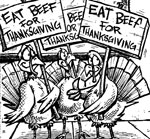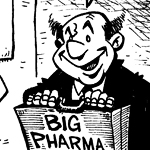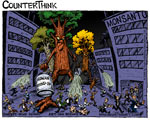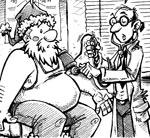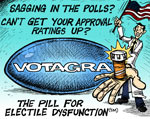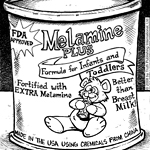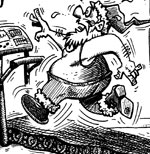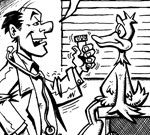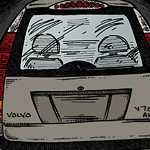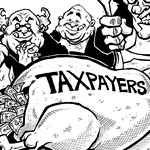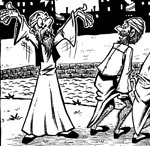Three Things Everyone Who Has Gained Weight While on Antidepressants Needs to Know about the Serotonin Power Diet
| Share on Facebook | Share on Twitter | Share on Google+ |
In the 1990's, the treatment of depression was revolutionized by the introduction of selective serotonin reuptake inhibitors, also known as SSRIs. A class of drugs including Prozac, Paxil, and Zoloft, and later Luvox and Celexa, the SSRIs were not the answer for everyone who had depression, but they were successful for more people who had depression than any medication available before them.
Also in the 1990's, the treatment of obesity was severely tested by the hundreds of thousands of people who had experienced severe weight gain while using these drugs. People who had never been overweight in their entire lives gained 20, 50, 100, and even 200 pounds (10 to 90 kilos), without conscious changes in their eating habits.
Before the 1990's, most people who experienced midlife weight gain had put on the pounds due to lifestyle changes related to school, jobs, marriage, children, and travel. After the 1990's, at least as many people experienced moderate to severe weight gain after using prescription antidepressants.
The way SSRIs work, the brain is forced to keep more serotonin in the gaps between neurons. But to conserve serotonin, the brain has first to make serotonin, and getting the amino acid tryptophan, from which serotonin is made, requires the help of insulin. ( You might also be interested in tryptophan and serotonin).
Insulin, in turn, is more abundant after people eat sweets and high-carbohydrate foods. Millions of people put of SSRIs for depression experienced constant cravings for sugar and starch, filling them with excess calories and excess insulin, which stores both sugar and fat. Doctors were not prepared for the weight gain-related side effects of Prozac, Paxil, and Zoloft, and weight loss experts weren't, either.
Solving the riddle of carbohydrates. The diet gurus of the 1990's said the answer to antidepressant-induced weight gain was simple: Just go on a high-protein diet. The Atkins diet became extremely popular during this time, to be followed by the South Beach Diet Program.
As long as people stayed on their high-protein diets, they did not gain weight, and in some (but not all) instances, they lost substantial amounts of weight. The problem with high-protein diets while taking SSRI antidepressants is that protein foods not only provide high amounts of the amino acids tryptophan the brain needs to make serotonin, they also provide high amounts of the amino acids leucine and phenylalanine that keep tryptophan out of the brain.
Getting off Atkins felt good. It made it easier for the brain to absorb tryptophan to make the serotonin demanded by the medication. And when people taking antidepressants got off any diet, the first foods they reached for were invariably sugary desserts-like a whole box of donuts-and comforting mashed potatoes, the whole bowl, please.
When people on SSRIs abandoned their diets, they quickly found that carbohydrates were the only foods they wanted. As belly fat grew, stress about being fat grew, too, depleting the brain of serotonin, and stimulating the appetite for carbohydrates even more. The appetite for carbohydrates took on aspects of addiction, and, for many people, the ever-increasing spiral of appetite and weight gain became completely impossible to control.
The reason no-carb diets don't work. Scientists at MIT looked for an explanation of why carbohydrate should be so essential to satisfying appetite. They recruited volunteers to go on a no-carb diet and then give blood samples that would show whether their brains were making serotonin.
The MIT scientists found that even if the diet provides lots of the amino acid tryptophan, the brain does not receive it and make serotonin unless there is at least some carbohydrate in the diet. If there is no net absorption of tryptophan, then there is no new serotonin in the brain. If the brain did not receive the raw materials for making serotonin, then SSRIs would not work. The more depressed the no-carb dieter, the more likely he or she was to go off the diet and binge on sugars and carbs.
The perfect tool to manipulate serotonin levels. Were the two possibilities really losing weight on a low-carb diet and feeling lousy or gaining weight on a high-carb diet, and also feeling lousy? The MIT researchers set out to find out.
At first the scientists thought that maybe people got depressed because they missed the tastes and textures of their favorite comfort foods. The researchers designed an elegant experiment to see whether this was so.
Non-depressed volunteers, who had normal serotonin levels, were given either a placebo or a low dose of an SSRI. The SSRI would make serotonin more active in the brain, and the scientists were reasonably sure that any results of the test would be related to serotonin, not to food itself. The scientists found that volunteers who were given the SSRI lost their interest in food.
One volunteer said, "I used to eat the leftovers just as soon as I put them in the refrigerator. Now I am happy with just a small meal." Then the question became how to help people with low serotonin levels master their food cravings.
Snacks to the rescue. It turned out that the way to help people avoid eating large amounts of carbohydrates was to make sure they ate small amounts of carbohydrates, about an hour before eating a high-protein meal.
It was not necessary to eat a lot of protein. As little as 10 grams (45 calories) could make a substantial difference. But eating small amounts of carbohydrate that stimulated small amounts of insulin release was enough to help small amounts of tryptophan enter the brain, just enough for the brain to make the serotonin it needed. And when the brain had enough serotonin, it was easy to control appetite.
How can the serotonin power diet work for you? You can read a lot more about serotonin power in the book The Serotonin Power Diet by Judith Wurtman and Dr. Nina J. Frusztajer. But in the meantime, here are three things to help you get started on your own serotonin-plus weight loss program:
- Choose a carbohydrate snack you really enjoy, that is available in servings of 100 calories or less.It's OK to like the food if you can obtain if in serving sizes that keep you from overeating. Buy enough for three snacks a day.
- Every day, one hour before each of your meals, set aside the 100-calorie serving of your favorite high-carb food and eat at your own pace. It's better not to gulp it all down all at once, but it's OK-as long as you stop with one serving.
- Then eat your normal diet meal for breakfast, lunch, and dinner.
The results of this approach to dieting may not be immediate, but in about two weeks you may notice that you feel good, and you are suddenly losing weight the way your diet plan predicts. Think of your serotonin weight loss diet as a low-carb diet that you get off three times a day, by plan, choosing a food you really like, but in a small serving.
Your brain will be able to make the serotonin it needs, but you will be able to control your appetite and lose weight.
Oral Serotonin Supplementation and Weight Loss - Robert Posner, MD
-
Skin CareMen Skin Care
-
Free ResourcesFree eBooks
-
Health is not simply the absence of sickness.Hannah Green
-
Featured Health Supplement"...I also suffer from mild-to-moderate depression, so several months ago as an experiment I ordered a few bottles of the Neuro-Natural Serenity formula, but never took it consistently. However, I started taking it faithfully last week at full dose and already my spirits are lifting and I have a greater clarity of mind."
Cathi, USA -

